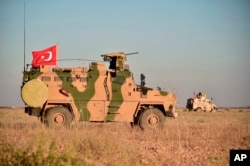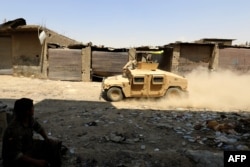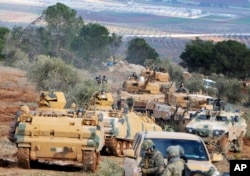Leaders from Iran and Turkey are scheduled to hold talks Thursday, a day after U.S. President Donald Trump announced he was withdrawing American forces from Syria because they defeated Islamic State militants in the country.
Iranian President Hassan Rouhani's visit with Recep Tayyip Erdogan in Ankara could worsen U.S.-Turkish relations, which have been strained recently over Ankara's threat to attack a Syrian Kurdish militia that is a key U.S. ally in the fight against IS.
How the U.S. will remain engaged in the region following the troop pullout remains unclear, but a White House statement called the withdrawal the "next phase" of the military campaign, which remains focused on denying "radical Islamist terrorists territory, funding, support and any means of infiltrating our borders."
Troop withdrawal impact
Syrian Kurdish allies of the U.S. reacted with alarm to the announced pullout, saying a rapid withdrawal would leave them vulnerable to the threatened Turkish offensive.
In Ankara, Rouhani is expected to try to further widen the Turkish-U.S. rift over Washington's support for the Syrian Kurdish militia, the YPG.
With the militia controlling around a quarter of Syrian territory, analysts suggest Washington now sees it playing a role in containing Iran's growing influence in Syria.
Ankara accuses the YPG of supporting the PKK Kurdish rebel group that has been fighting a decades-long insurgency in Turkey. Erdogan is vowing to oust the YPG from Syrian territory bordering Turkey, and Turkish forces are massing on the frontier.
International relations professor Huseyin Bagci of Ankara's Middle East Technical University said, "It's possible if Turkey intervenes in Syria, Turkey would be on the opposite side of America and confrontation would be inevitable, and probably the Iranians suggest it would support Turkey."
Cooperation
With Iran having its own restive Kurdish minority with similar secessionist aspirations, Bagci suggests Rouhani most likely will reach out to Erdogan on the need to work together.
"The Iranians have the same Kurdish problems like the Turks. There are many common positions," Bagci said. "The Turks, the Arabs and Iranians have a common enemy, in quotation marks, the Kurds, which will try to establish a possible Kurdish state in the region. At the moment, Americans seem to be the protector and supporter of this Kurdish state."
But analysts say the Damascus regime Tehran supports may have reservations over any Turkish operation in Syria, even though it, too, shares concerns about Kurdish secessionism.
"A non-YPG-dominated region is in the interests of Damascus, so Damascus may be happy to turn a blind eye [to a Turkish operation]," said former senior Turkish diplomat Aydin Selcen. "But of course, Damascus will not welcome an indeterminate Turkish armed forces presence on its own territory."
In a move to assuage Damascus' concerns, Iranian officials Wednesday said Ankara must secure Damascus' permission for any military operation into Syria.
Damascus strongly opposed two previous Turkish military operations against the YPG in Syria. Turkish forces now control a large swath of Syrian territory. Analysts suggest Ankara's control of Syrian territory is part of a strategy to ensure it has a voice in deliberations on the future of Syria.
Iran and Turkey remain historical regional rivals even though they are working together on Syria. Bagci suggests the rivalry could ultimately mean that Turkey and the United States share the goal of containing Iran.
"Turkey is also not happy that Iran is gaining more and more space and influence in the area," said Bagci. "In the long run, Turkey understands it will be the loser." '
Ankara's long-term strategic regional interests may be closer to Washington's than Tehran's, said former Turkish diplomat Selcen, if Washington abandons its support of the YPG.
"It's a continuation of their [Washington] policy with other means and other partners," said Selcen. "They wish to deny this area to Iran, from east of the Euphrates. Once Turkish forces are there, it will mean Iran will stay out."
Matter of trust
Analysts point out Erdogan's inviting Rouhani to Ankara at such a critical moment in U.S.-Turkish relations will provide ammunition to the Turkish president's critics in Washington who say Turkey has become an unreliable ally.
Erdogan invited Rouhani to attend the fifth meeting of the Turkey-Iran High Level Cooperation Council, which was created to coordinate diplomatic and economic activities.







